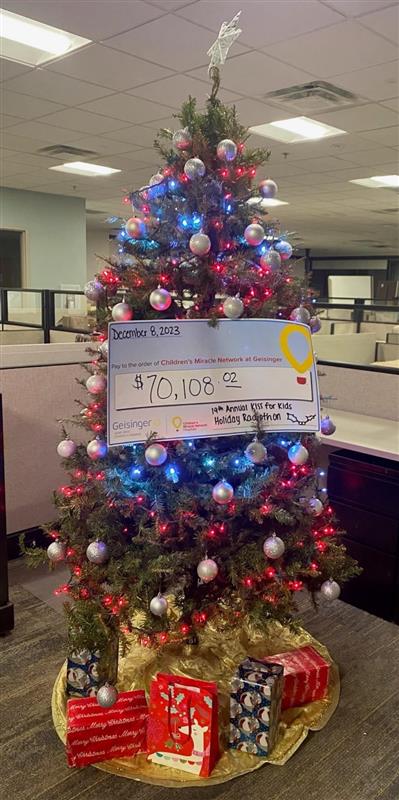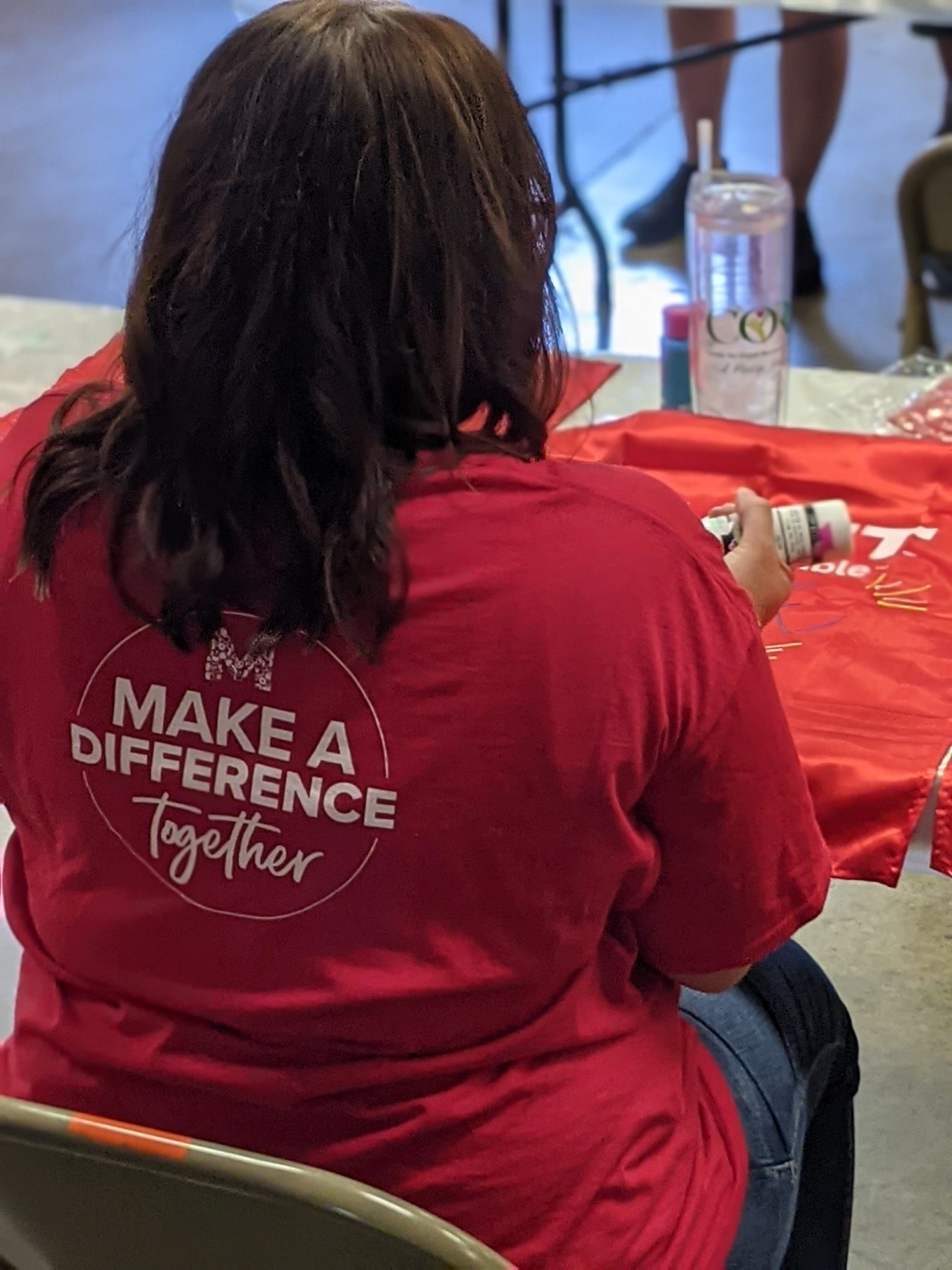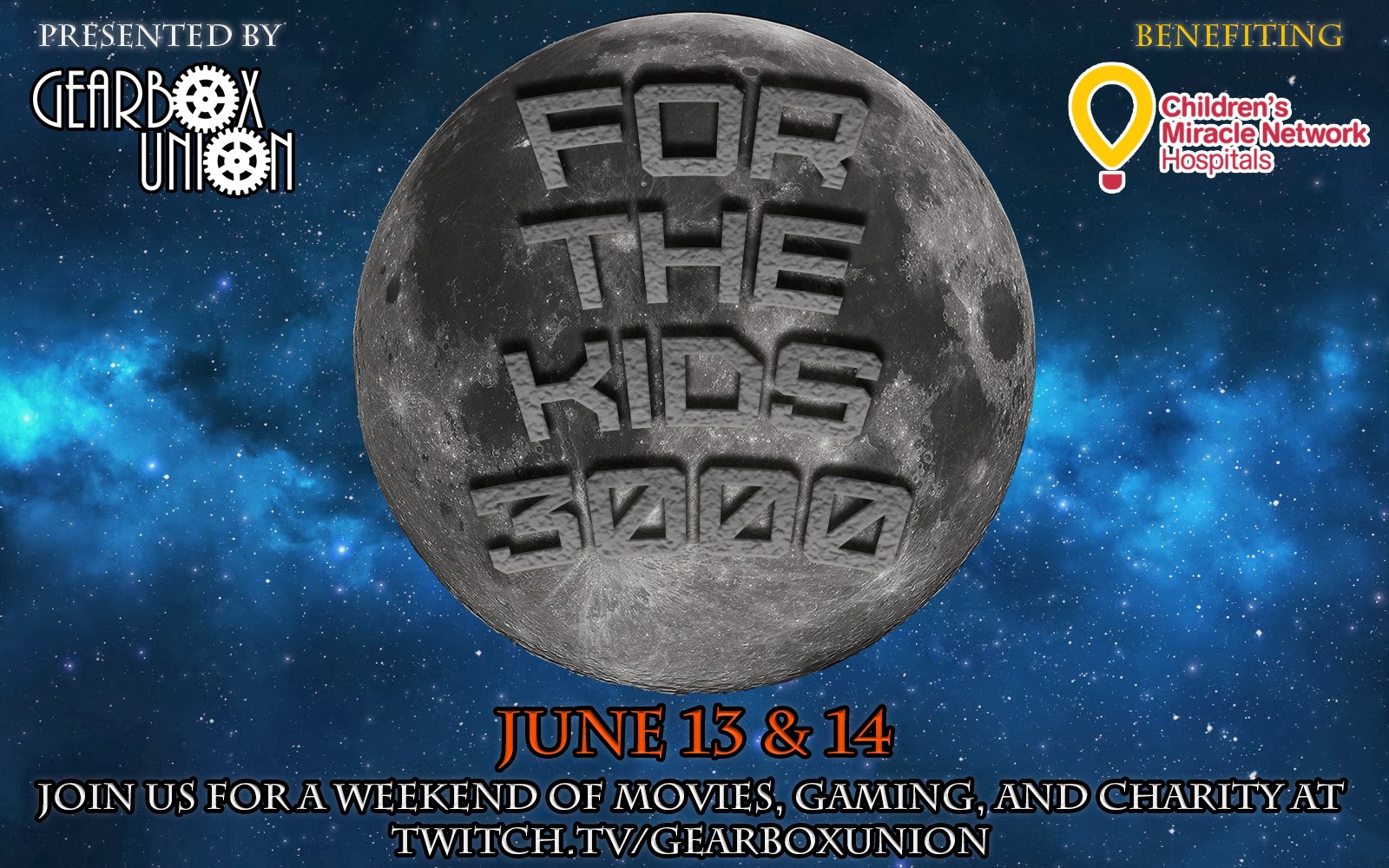2017 Miracle Kid Will Barrick
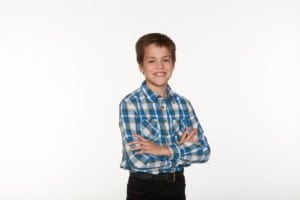
Eleven-year-old Will Barrick is as competitive as they come. He plays basketball, soccer and baseball and has a built-in opponent with his brother, Sam, who’s 12.
“I can’t beat him [in basketball] – he is too tall,” Will says.
“That’s a tough one for Will,” says their mother Kelly. “He likes to win.”
When he isn’t playing sports and being active, he is usually watching sports on TV.
“When the boys were young, I would plop them down and put a kid show on. Will would have nothing to do with it,” Kelly said. “He would go outside and play on the hill. He was always moving.”
Perhaps it was Will’s competitive spirit or his will to live that gave him the courage and the ability to face the battle of his life at just 7 years old.
In the summer of 2012, Will began experiencing ear pain. His parents thought the pain was headaches, but as time went on it got progressively worse. It became so bad that Will would scream and cry in pain. Kelly took him to the family pediatrician several times, who could not find anything wrong.
As it got closer to Christmas, Will’s pain worsened. Kelly made an appointment with an ears, nose and throat specialist (ENT) in Lewisburg, but he also was unable to find a cause for the pain. The ENT said they should go to Geisinger.
Kelly’s brother was working with some doctors from Geisinger in Lewisburg and spoke to them about Will’s problem. The doctors said the family should see Michael Ryan, DO, pediatric infectious disease specialist at Geisinger Janet Weis Children’s Hospital, who got Will in immediately in early February.
“He was in obvious pain, crying and hurting. I looked in his ears and they were perfectly normal,” Dr. Ryan said. “My heart sunk. I knew it was something bad, because when you see that the ears aren’t affected, you know it is in the brain.”
Dr. Ryan scheduled an MRI right away. The results were not good. Dr. Ryan told the family there was a mass in Will’s head.
“They found a very complicated tumor that had branches. One of the branches went behind his eye, one went behind his nose and one went downward,” Kelly said.
Because of the tumor’s location and presentation, the team of doctors originally thought the mass was a trigeminal schwannoma, which is a slow-growing tumor that is usually benign. The mass was around a segment of the left trigeminal nerve, which transmits sensations from the face to the brain. It was about 3 by 3 centimeters and was moving toward his sinus cavity.
“The doctors explained that these are tumors that people can walk around with their whole lives and never know that they have them. They said it was a slow-growing thing that you can live with,” Kelly said. “But clearly since Will was having such pain, it needed to be taken out.”
The pediatric surgical team was in the process of trying to schedule a craniotomy and working to figure out the best way to get access to the tumor.
“In the meantime, Will was home off school and he was just getting worse very quickly,” Kelly said. “According to the first diagnosis, this was a slow-progressing tumor and we shouldn’t see any change. However, on Feb. 14 [2013] his eye completely turned in toward his nose.”
Kelly immediately called the doctors at Geisinger Janet Weis Children’s Hospital. They determined that the tumor must have grown and impacted Will’s optical nerve, pushing his eye inward. Doctors immediately scheduled Will for a biopsy. The tricky part was the tumor’s difficult position. Any procedure to try to reach it could risk serious injury.
Alfred Kennedy, MD, pediatric surgeon, came up with a plan for the biopsy. Dr. Kennedy went in under Will’s upper lip and pulled a tissue sample of the tumor from behind Will’s nose. The sample was sent to pathology which determined that the mass was lymphoblastic lymphoma, a cancerous tumor. He was referred immediately to Jagadeesh Ramdas, MD, director of pediatric hematology/oncology at Geisinger Janet Weis Children’s Hospital.
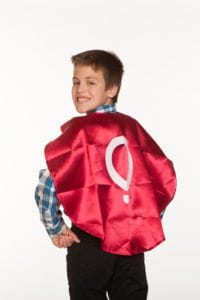
“I was a little uncomfortable with the pathologist’s report, because first it is not something you typically encounter with a child Will’s age. Also, he had no prior immune deficiency or any pre-existing illness, which would most likely occur before this type of lymphoma,” Dr. Ramdas said. “Also, one of the markers for this type of cancer came back negative. This was a red flag. In 99 percent of lymphoblastomas, that marker comes back positive. The fact it came back negative made me highly concerned that it might not be what it looked like.”
Dr. Ramdas requested that the samples be sent to the National Institutes of Health (NIH), where a pathologist colleague of his reviews dozens of samples from around the country daily.
“I was so pleased with the decision to send the samples to them,” Dr. Ramdas said. “In just a few days, the pathologist reviewed the slides and did some additional screenings. She determined it was Burkitt’s lymphoma.”
“That [the diagnosis] was the toughest time because no one seemed to have any answers until after the biopsy/genetic study,” said Will’s father Brett. “Once he was diagnosed with cancer, however, treatment proceeded rapidly.”
Burkitt’s lymphoma is recognized as one of the most aggressive and the fastest growing human tumors. It multiplies rapidly and can be highly fatal if left untreated. The diagnosis made Will a high-risk case. Dr. Ramdas needed to plan for the most intense chemotherapy treatment to battle the disease, which involved multiple spinal taps — twice weekly — along with multiple rounds of chemotherapy over the next six months.
“The doctors and nurses explained that when you are dealing with a brain tumor, there is a shield that your body has to keep things like chemotherapy from getting up your neck to your brain,” Kelly said. “The spinal tap is the only route to get the medication to the head. They were actually injecting chemotherapy into the spine.”
The treatment was very difficult, and Will and his family needed to be ready for the fight of his life. Each treatment required him to stay in the hospital for five days. Often, after being home for few days, Will would become neutropenic and need to be admitted for several more days. Neutropenia is a condition where the white bood cell count becomes too low and the patient becomes very susceptible to infection. With neutropenia, even the normal bacteria from your mouth and digestive tract can cause serious infections.
After only two cycles of therapy, the Barricks received encouraging news.
“The response was dramatic. We did an MRI after two cycles of induction therapy. We found that the mass had drastically decreased in size — it was down 80 percent from what it was before,” Dr. Ramdas said. “It was very encouraging, and his pain symptoms completely went away.”
But Will’s treatment needed to continue to completely wipe out the cancer.
“The treatment included some really nasty, aggressive drugs. We were inpatient a lot,” Kelly said. “At one point during treatment he got C. diff. We were in isolation for a week, which was absolutely the worst.”
Clostridium difficile or C. diff. results from the disruption of normal healthy bacteria in the colon. It can cause severe damage and even be fatal, with severe symptoms of diarrhea, belly pain and fever.
During Will’s hospital stays, Kelly stayed in the room with him. She and Brett split time at the hospital. But since Brett was working, Kelly took off work to care for Will during treatment.
“I would run home and get a shower and run back up to the hospital to stay with him,” Kelly said.
The treatment was incredibly trying for Will.
“I understood everything that was going on, and it was scary,” Will said.
“He hated having his metaport [the access site for medication infusion] accessed and it would take six of us to get that done,” Kelly said. “We had some pretty serious conversations, because Will is a pretty headstrong young boy. Sometimes his attitude was, ‘Well, I’m just not going.’ We had to have conversations about what the consequences would be — if he didn’t get in the car and go to the hospital. That was a lot for a 7-year-old to manage.”
The doctors and nurses not only focused on Will during his treatment, but also paid close attention to Kelly and Brett.
“They never left the room without stopping to ask us if we needed anything. You can’t imagine how comforting that was,” Brett said. “They were great at explaining Will’s course of treatment and keeping us calm.”
Will was out of school the entire time during his treatment. One of the teachers from Lewisburg Area School District volunteered time to help Will keep up on his studies for second grade.
Finally, on July 26, 2013, Will completed his cancer treatment.
“It was a short but very intense treatment lasting six months,” Dr. Ramdas said. “The good thing was the tumor had completely gone away, and we didn’t have to do any radiation therapy. Since July 2013, he has been off treatment.”
Following his treatment, Will had corrective eye surgery performed by Thomas Wilson, MD, pediatric ophthalmologist and eye surgeon, to move his eye back into the proper position. His vision was never impacted by the tumor.
From his treatment and long hospital stays, Will remembers the activities provided by the Child Life Department, as well as visits from the therapy dogs and the Wilkes-Barre/Scranton Penguins.
“He also liked the slushies very much,” Kelly said. “We always tried to keep it light during treatment. We goofed around and laughed, and Child Life helped with that.”
When Will finished treatment and started playing sports again, he had a hard time running after being still for so long. It took a full year for him to completely recover and get back to himself.
Will is now back into sports with his favorite sport being a tossup between soccer and basketball. He also plays piano and is learning to play alto saxophone — but mostly he just loves sports.
“Do you remember the Spice Girls? Well, we call Will ‘Sporty Barrick,’” Kelly said. “It was a strange thing when he was sick, because he was the healthiest child and was always active. It was a real blow watching as he couldn’t move. He was just laying around.
“The one thing I would say is it never crossed my mind that he wouldn’t make it out of that situation,” she said, tears welling up in her eyes. “I didn’t even consider it. I don’t know if that was a good thing or a bad thing, but I just kind of plowed through it.”
Brett and Kelly agree that Will is a fighter and was very strong through his specialized treatment at Geisinger Janet Weis Children’s Hospital.
“Although we were aware of the seriousness of his condition, I personally acted with the conviction that Will was going to beat the cancer. The opposite was unthinkable to me,” Brett said. “We were confident that Will was receiving state-of-the-art care.
“He is a miracle, because anyone who can suffer the pain and sickness which he did and do it with a smile — except when needles were around — is very special,” Brett added.
In addition to providing funds to the Child Life Department at Geisinger Janet Weis Children’s Hospital, Children’s Miracle Network at Geisinger also allocates money to Camp Dost, a program of the Ronald McDonald House of Danville. Camp Dost is a weeklong specialty camp for kids who are undergoing treatment for or who have overcome cancer. Will has been a participant at the camp since 2013, when he went for the first time right before completing his final treatment.


